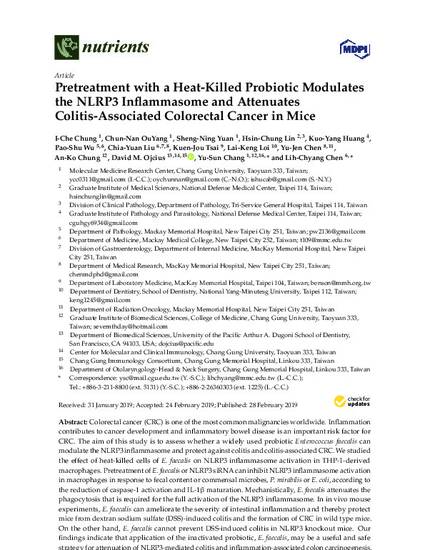
© 2019 by the authors. Licensee MDPI, Basel, Switzerland. Colorectal cancer (CRC) is one of the most common malignancies worldwide. Inflammation contributes to cancer development and inflammatory bowel disease is an important risk factor for CRC. The aim of this study is to assess whether a widely used probiotic Enterococcus faecalis can modulate the NLRP3 inflammasome and protect against colitis and colitis-associated CRC. We studied the effect of heat-killed cells of E. faecalis on NLRP3 inflammasome activation in THP-1-derived macrophages. Pretreatment of E. faecalis or NLRP3 siRNA can inhibit NLRP3 inflammasome activation in macrophages in response to fecal content or commensal microbes, P. mirabilis or E. coli, according to the reduction of caspase-1 activation and IL-1β maturation. Mechanistically, E. faecalis attenuates the phagocytosis that is required for the full activation of the NLRP3 inflammasome. In in vivo mouse experiments, E. faecalis can ameliorate the severity of intestinal inflammation and thereby protect mice from dextran sodium sulfate (DSS)-induced colitis and the formation of CRC in wild type mice. On the other hand, E. faecalis cannot prevent DSS-induced colitis in NLRP3 knockout mice. Our findings indicate that application of the inactivated probiotic, E. faecalis, may be a useful and safe strategy for attenuation of NLRP3-mediated colitis and inflammation-associated colon carcinogenesis.
Available at: http://works.bepress.com/david-ojcius/294/
